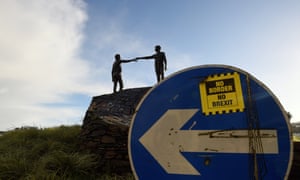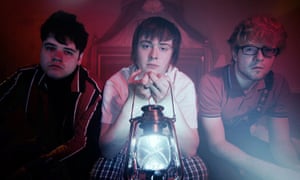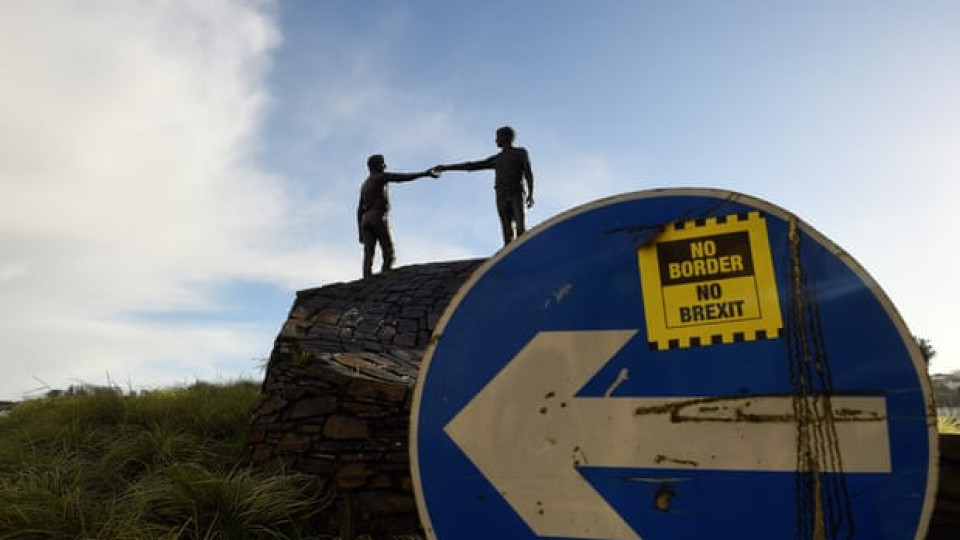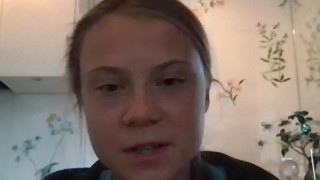
England’s casual indifference to the border question has betrayed the post-Troubles generation

Touts are a three-piece rock band from Derry. The name is a reference to the Northern Irish colloquialism for a police informer, which is scrawled and sprayed around their home city; the music they make is full of a sense of Derry’s violent past and its uneasy present. It harks back to the distant days of punk rock, but its sheer velocity also speaks of an urge to get on with the future, whatever that might be. The band are part of a lineage of music interwoven with Northern Ireland’s difficult politics and history: as the Belfast-based music writer Stuart Bailie’s brilliant book Trouble Songs puts it, raw art that has “challenged given stories” and provided “succour and a sense of collective worth”.
All three Touts members were born at a time when the Troubles were receding into history; two of them were too young to vote in the 2016 EU referendum. Last week, I watched them rehearse, in a freezing room on an edge-of-town industrial estate. They talked about Northern Ireland’s political predicament with the kind of incisive eloquence that most English musicians seem to have lost. “Politics is just inescapable, coming from here,” said 21-year-old bassist and co-vocalist, Luke McLaughlin. “If you have a platform, you may as well say something.”
The band’s drummer, Jason Feenan, 19, mentioned a video he had seen online of the then-Brexit secretary Dominic Raab being questioned by the Northern Irish MP Sylvia Hermon, and awkwardly admitting that he had never made time to read the Good Friday agreement. “Every household in the North has a copy of it,” Feenan marvelled. “You could read it in a day. And someone supposedly negotiating on our behalf couldn’t even be bothered.”
He looked pained. “It’s kind of Irish history repeating itself,” he said. “A decision’s made in England, and we’re just dragged along with it.”
Over four very sobering days, this was a sentiment I heard time and again. After I left Derry, with ringing ears, I drove along the often labyrinthine border between Northern Ireland and the Republic, stopping to talk to people for whom that largely invisible line had been a complete irrelevance until the great convulsion of June 2016 put it back on the political agenda. Just about everyone I met knew perfectly well that Theresa May’s travailsover the so-called backstop are the product of politicians and voters elsewhere forgetting about the island of Ireland, only to be reminded that for the people who live there, Brexit represents a profound set of dangers. No one was that surprised about this amnesia, but many were very angry about it.
The boredom with Brexit that I have endlessly encountered in England was nowhere to be seen. Eighty-eight miles from Derry in the old port city of Newry, people talked about a place that had lived in the shadow of the old border for more than 60 years and suffered dire economic consequences, only to undergo an amazing recovery that suddenly feels fragile. Here and elsewhere, there was exasperation at the historical accident that had made Theresa May dependent on the Democratic Unionist party, whose original opposition to the Good Friday agreement still rankles and whose hostility to the backstop is a central part of Northern Ireland’s current pain. On the other side of the sectarian divide, in even the sleepiest places, I spotted newly printed posters and hoardings demanding a united Ireland, their strident tone betraying the fact that setting out on that road would inevitably trigger no end of strife.

Across the sea, Brexit has triggered a certain obstinacy and aggressive nostalgia among older people, and here, you can pick up something comparable. In the tiny southern Irish border town of Clones, a sixtysomething drinker in a local bar said that Britain could have Brexit if it “gives us back the six counties”, while a younger man shook his head at the discomfiting echo of conflicts he obviously wanted to forget. In Enniskillen, a local member of the DUP who had served in the British army told me that if there was any serious attempt to unite Ireland’s two halves, “I would stand back, and get my uniform back on, and stand firm with the British.”
Everywhere I went, people whose views were less entrenched asked the same set of questions. If the UK leaves Europe with no deal, and Northern Ireland and the Republic are suddenly separated by tariffs and new regulations, would that mean the return of what official-speak calls “border infrastructure”? If it did, wouldn’t that give people spoiling for a fight something to shoot at, or blow up? Whatever the prime minister’s current contortions, what if Brexit – even with a deal – and the Ireland envisaged by the Good Friday agreement turn out to be mutually exclusive?
Such points were usually balanced by a set of convictions people seemed to be clinging to: that no one wants the border back, and any kind of reversal of the peace process is unthinkable. But then the unease would return as it was acknowledged that Brexit is a veritable Pandora’s box, brimming with unforeseen consequences.
What lots of people understood as a matter of instinct was obvious: that in the context of the peace process, the UK’s exit from the EU is a colossal breach of trust, made infinitely worse by the fact that it has been perpetrated so casually. The guilty parties stretch from mindless Tory Brexiteers, through the Labour politicians who have accepted our exit as a given, to the kind of voters who seem to have instant recall of the distant glories of the second world war but huge blind spots when it comes to a conflict that was still rocking the UK only a quarter of a century ago.
As a recent car bomb in Derry proves, the challenges of peace and stability are by no means over. Thanks to an arcane scandal about government subsidies for renewable fuels – which involved vast amounts of wasted public money – and tensions between Sinn Féin and the DUP over the Irish language, there has been no devolved government since January 2017. The damage caused to relations between Dublin and London by Brexit is hardly helping. Among people of Touts’ generation, some of the most pressing political issues centre on the fact that as the Republic has been pushed into a new era of social liberalism, Northern Ireland has been exposed as the last redoubt of very different official attitudes, where abortion remains illegal and equal marriage is still being fought for. And stark regional inequalities have yet to be tackled: for all its cultural vivacity, Derry has deep-seated problems with unemployment, and a gross median wage £69 per week lower than in Northern Ireland as a whole.
All this feeds into a deep sense of anxiety and uncertainty, not least among young people who yearn to escape the pull of the past and find out what the future might hold.
Touts have a song titled Bomb Scare, which, they say, juxtaposes observations of racism in the US and the European refugee crisis with the insecurities of their home turf. Its chorus sounds like a glimpse of very real fears: “Checkpoint Charlie / It’s not my heaven / It’s where we’re headed / It’s really not that far away.” To my English ears, it also suggests a finger angrily pointed at people who averted their eyes from Northern Ireland, and thereby committed the gravest Brexit folly of all.
The Guardian











Leave a comment